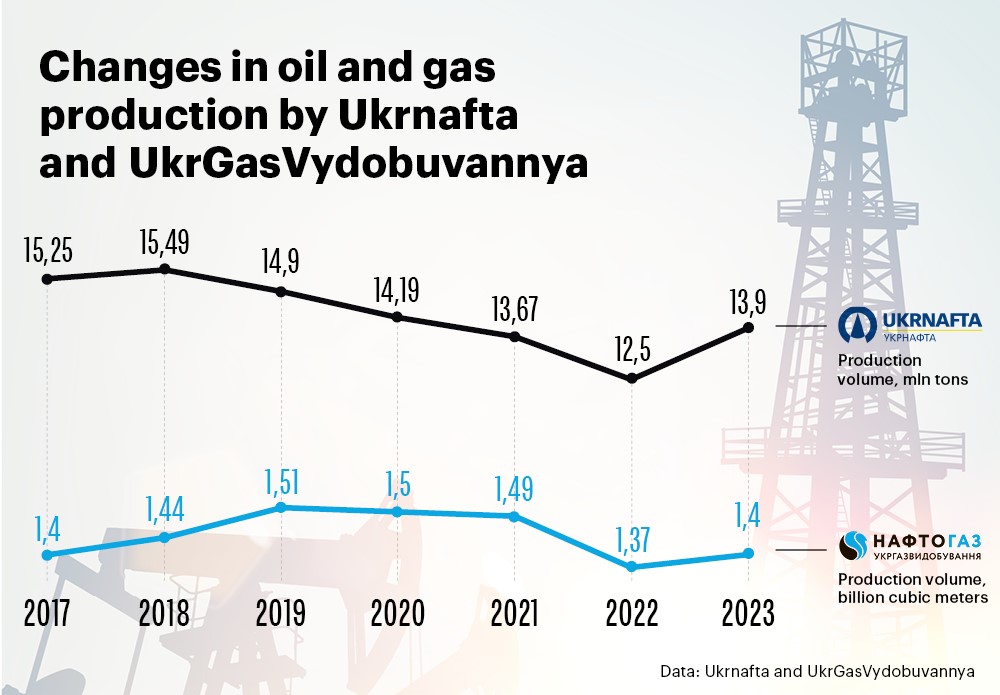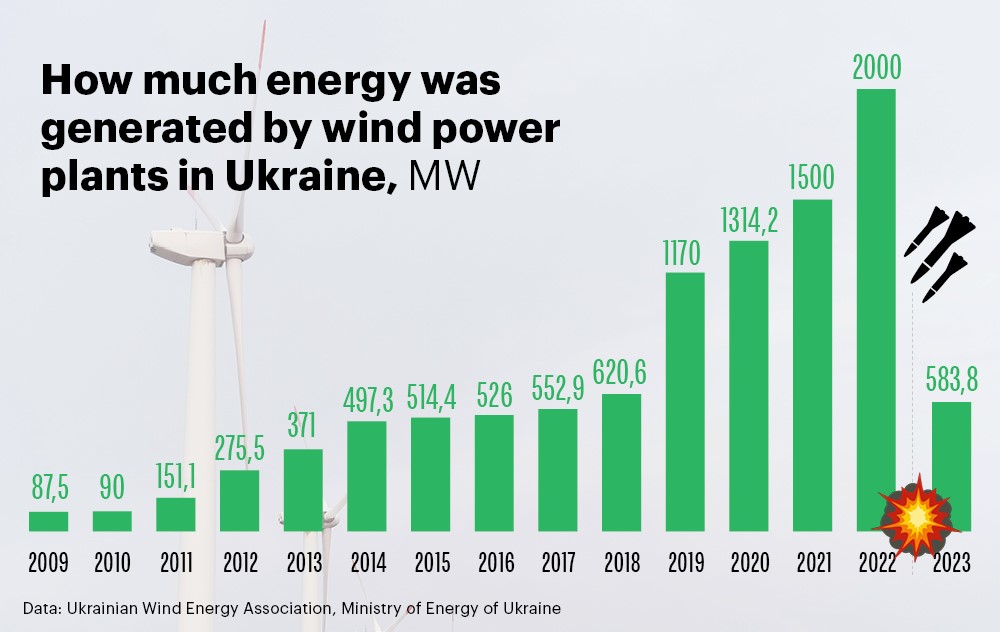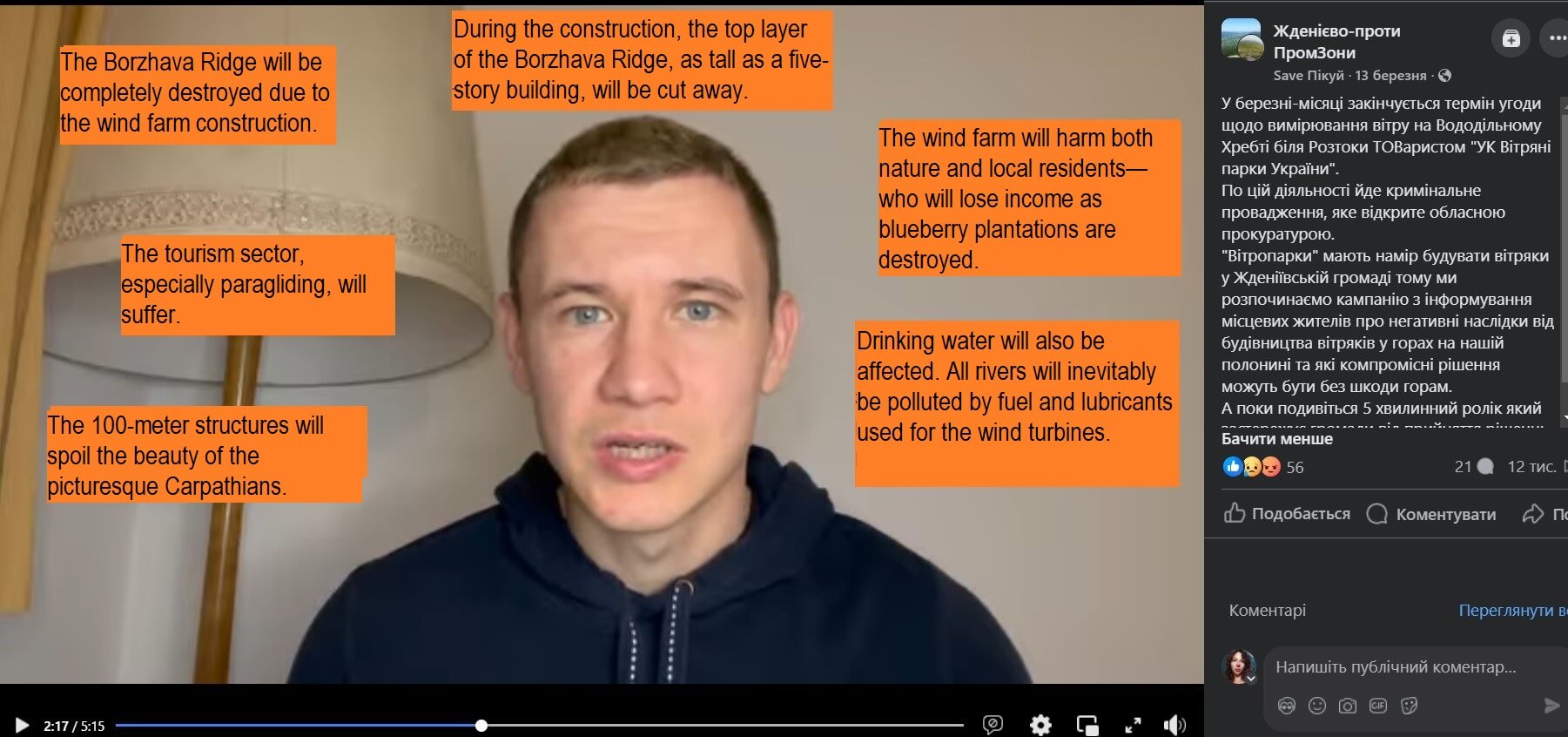“Windmills are going to pull dogs out of their kennels”: Oil and gas sector’s disinformation preventing the development of clean energy in the Carpathians
The project is supported by the Bertha Foundation.

Author: Liubov Velychko
The Zhdeniyivka Community is encircled by dense virgin forests covering the ranges of the Carpathian Mountains. There are several national parks on its soil, so valuable that Ukraine has pledged to the European Union to keep them intact.
Therefore, no work can begin here without the Ministry of Ecology's statement that a particular project is environmentally safe. And when heavy machinery rolled onto the picturesque hillside and started to pave the path to the gas production site near the village of Bukovets, local residents protested. Ukrgazvydobuvannya, a state-owned enterprise that produces about 73% of Ukraine's gas, launched the work in violation of all environmental requirements and local government principles.
As part of its investigative report, Mind examined how disinformation in favour of the oil and gas sector obstructs the advancement of clean energy in Ukraine. The local conflict between communities in the Carpathian Mountains and oil and gas monopolists and wind farm builders is a perfect illustration of the problem.
The gas war
"Gas workers appeared in Bukivtsi unexpectedly," recalls environmental activist Nataliya Vyshnevska, "The community was not duly informed, as required by law, and we were not provided with permits for these works or resolutions of the village council. They just came, made a personal agreement with the previous village mayor, and started damaging the land and nature – right next to the protected forests of the botanical reserve."

The confrontation between Ukrgasvydobuvannya and the Bukovets village community resulted not only in protests but also in protracted litigation. The Transcarpathian Oblast Prosecutor's Office also filed a lawsuit against the gas producer, requiring that the decision of the Bukovets village council be reversed and the exploration agreement be declared invalid.
The case was heard by the courts of all instances. And finally, the Supreme Court recently sided with Ukrgasvydobuvannya: the hearing was held in Kyiv, and the activists failed to come from remote Transcarpathia. So the community paid a fine of UAH 6,000 to the company. And that was the end of their court battle.
"At first, when the gas company only arrived and started digging and paving the road, there were around a hundred people near the village. They were shouting, not letting the equipment in," says local resident Sergiy, who also took part in the protests. "Then, when the trials started, only 20-30 people remained active. By the end, there were two or three, barely five to go to the court hearing in a bus a hundred kilometres away, to Uzhgorod. We came, made some noise, said that nothing should happen there, and that was it. We won the trial in Volovets and the appeal, and then it was on to Kyiv... Who can go there?"
Ukraine's current climate goal is to reduce greenhouse gas emissions by 35% by 2030 compared to 1990.
The author of this article visited the site where the gas well had been drilled. It's less than 2 km from the village centre, but the journey takes half an hour because you have to ascend from the valley to the mountain. We were accompanied by 37-year-old Vasyl, who has lived in Bukovets his entire life. On the way, he recalled how, as a child, he used to walk through three-metre-high snow tunnels in the yard in winter: "There was so much snow that only the roofs of the houses were visible from under it. The frost was consistently 20-25 degrees. And nowadays, if there's a metre of snow, it's good. And summers have become hotter. I used to always take a warm sweatshirt in the morning even in July because it was chilly. Now the heat reaches 40 degrees sometimes – an uncommon anomaly for our region."
This trend has been observed over the past ten years. Warming has also affected water bodies – rivers dry up, other species of mushrooms grow in the forest – more white ones. There are also many snakes, and their nests are getting closer to people's homes.
Upon reaching the geological exploration site, we make sure that there is no one there and no work is being done. But Ukrgasvydobuvannya has a permit to perform geological exploration until 2037, so there is enough time to return.
Chemicals "as a souvenir"
Locals say that even now, several years after the start of drilling, they are experiencing the negative effects of these operations. Ecologist Artur Raichynets, a member of an activist group opposing gas production in the Carpathians, says he and other activists have spotted a pit with chemical waste that gas workers had dug near the site of geological exploration. In his opinion, the water quality could have been affected not only by the drilling process, but also by the aggressive chemicals used by the drilling technicians, which now ended up in the ground.
"In the environmental impact assessment report, the company claimed that it would use certain chemicals to help soften the ground during drilling. There were alkalis, acids, etc.," says Artur. "But it should have been like this: an indicative pit is dug, insulated with special films, and only then drilling waste is poured into it. And then it is pumped out for disposal. But because they didn't insulate these pits where these chemical components were mixed, it all soaked into the ground. The drilling site is located quite high, and there are wells in the valley below, and during precipitation, this chemical can be washed out and go into wells, streams, and other water bodies."

Drilling mud is a liquid used to flush wells during oil and gas production.It cleans the walls of the well as it moves inside the equipment.However, drilling mud can contain toxic substances that are dangerous to the environment.In addition to water, it can contain polymer mixtures, gases, liquids with oil products, gypsum or chlorine.

The community has no evidence of whether Ukrgasvydobuvannya representatives took the chemicals away with them. But it was only after the company started working here that the villagers noticed that the water in their wells became undrinkable.
"After their operations, the water in my well started to smell like rotten eggs. And I'm not the only one," says Bukovets resident Oleksandr. "We haven't done any laboratory tests yet (but we are going to do soon), but everyone attributes [the water damage] to this. We started drilling new wells last year near our homes, and it started to smell. I've never seen anything like this since I've lived here."
An unpleasant odour can be related to gas production.The "aroma" of rotten eggs indicates the presence of hydrogen sulphide (H₂S), a toxic gas that often accompanies natural gas and oil in deeper layers of the earth.Hydrogen sulphide can penetrate groundwater and other soil layers during drilling, causing contamination of wells and giving the water a characteristic odour.
"It's unreal to drink this water, it's only good for the toilet," adds another resident, Natalia, "And it's so greasy now that you don't even need soap."
The sensation of "greasy" water may indicate the presence of hydrocarbons or other chemicals that may have entered the aquifer as a result of a breach in the well's insulation or leaks during drilling.This effect is often observed when water is contaminated with traces of oil, lubricants or other substances used in the drilling process, or when gas and impurities leak into groundwater.
Ukrgasvydobuvannya assures that the drilling of a gas well in Transcarpathia near the village of Zhdeniyevo is carried out exclusively within the legal framework, and the only noticeable environmental change for the locals are the 20 square metres that the gas well will occupy after all the work is completed.
"Ukrgasvydobuvannya is experienced in working in mountainous conditions and cares about preserving the unique ecosystems near which it operates," the company's press service assures. “Thus, on the other side of the Carpathians, in Ivano-Frankivsk Oblast, oil and gas industries successfully operate, contributing to the country's own gas supply."

The company has not published any reports on the state of the environment at the geological exploration site near the village of Bukovets. This is a typical situation for Ukrainian oil and gas companies. But can we trust the reports that oil and gas companies do publish?
Clean water?
The Verkhnemaslovetske Oil Field is located 100 km from Bukovets, where another energy juggernaut, Ukrnafta, operates.

Work began in 2021, and two years later, the company published an environmental report on its website. It says that the water, soil, and air conditions are normal after the oil workers' activities. Our team decided to check whether this was true by taking water samples at the locations listed in Ukrnafta's report.
One of the sampling points is in the village of Yavoriv, Ivano-Frankivsk Oblast. There is a small river Lushchava, more like a stream. As soon as we started taking water from it, a woman's shout came from a neighbouring yard: "Don't take water from there! It's very dirty! Come here, I'll give you clean one!"

Olena, 28, is eight months pregnant. She says that she takes her drinking water from a water pipeline laid from the town of Dolyna, 50 km away. Like other residents of Bukovets, Olena complains that the water from the wells in Yavoriv is oily and tastes bad.
That the water is not suitable for drinking was also confirmed by the Khimanaliz (‘ChemAnalysis’) laboratory, where a sample of water from the Lushchava River was sent. The manganese content in this water was seven times higher than the norm. Drinking such water regularly can lead to health problems, scientists believe.
Scientific studies show that prolonged exposure to water with a high manganese content can lead to nervous system disorders, impaired coordination, and liver and kidney problems. It is especially dangerous for children and pregnant women to drink such water, as it can adversely affect the development of the baby's brain.

Could oil production contribute to an increase in the concentration of manganese in the river? Yes.
Chemicals are used during oil and gas production to help clean and maintain the flow. If these chemicals are released into the environment, they can leach metals, such as manganese, from soil and rocks into water. Accidental spills or leaks from equipment or pipes can also occur, and these also contaminate the water. This pollution contains not only oil products but also heavy metals, such as manganese, which are present in rocks or oil and gas formations.

"Saw nothing, heard nothing"
Vasyl Kultan, chairman of the Zhdeniyivka village council, is not against gas production: "There is a preserved area, but gas workers are far from it", "I don't know what this smell of rotten eggs can be connected with; this is the first time I've heard it from you", "Confrontation? What confrontation? There are only a few dissatisfied people there".
He is concerned about the financial state of the community, which is now appalling. The author was talking to the village mayor on 28 October in the administration's cold office: they decided to begin the heating season after the autumn holidays to save at least some money.

"This year, we have got a UAH 8 million budget deficit," explains Vasyl Kultan. "I have nothing to pay salaries with, and I have no one to fire, because we have already fired everyone we could. We are looking for at least some investors. If we don't find any, we will have to join richer communities."
During the war, the Zhdeniyivka Community's income dropped significantly – two large tourist bases and two forestries were closed due to the lack of tourists. "The war has shut down almost everything, we have only two tourist centres that still pay something and small shops. We also have the famous Viktor Medvedchuk's dacha in the area. It used to bring us a million hryvnias a year for renting the forest. But there is a criminal case, the property has been seized, and there is no more income," the village head laments.

When we start talking about global warming and its causes, Vasyl Mykhailovych mentions other investors who are ready to pay the community UAH 1.5 million annually if the community allows them to build several windmills for environmentally friendly electricity generation.
He calculated that if 15 windmills operate on their territory, local budget revenues will double. And this will finally make it possible to invest in the development of the community – road repairs, street lighting, renovation of the kindergarten and school.
Local councilmen see this opportunity as the last straw and are almost unanimously ready to vote for the decision. The village council has already signed a memorandum with Vitriany Park Verkhovynsky (‘Verkhovynsky Wind Park’) LLC. The document provides for an annual payment of 3% of the company's revenues to the community budget, as well as other social projects to encourage local residents to support this initiative.
"There is a windmill project in our community in Transcarpathia, even in the Mukachevo Rayon," says Vasyl Kultan, "And they have already started construction, and the project plans to receive 3% of this business. I think that next year everything will be fine, because this year the construction will be completed."

Not all locals support this idea, however. They are afraid that windmills will spoil the view of the mountains, and few people know about the benefits of their installation.
Conversations about windmills are constantly accompanied by fears and doubts. The chairman of the community has not yet carried out any awareness-raising activities; he plans to organise public hearings in the near future.
“I don't know how these windmills will prove themselves. My wife's brother in Czechia has a windmill on the plain. His house is 500 metres away. We used to stand by the garage there, and it spins constantly, but there is absolute silence. There's a plain around, fields, no mountains – just a field, and there's no noise at all, absolutely nil. But here are mountains, the landslides were massive. Who knows what could happen here?' says a senior man in a queue at a local shop.

"And remember the big storm here in August," the shop assistant replies, "A portion of earth came down from one of the mountains – there was such a heavy landslide that water poured out of that place, a column of water almost two metres in diameter. And now, when the windmill is installed here, they will have to level and concrete a large area, and level the mountain itself. How will this affect the environment?"
"...And people also say that the land for those windmills was not allocated in a quite transparent way," an old lady in the queue interjects. Everyone shakes their heads.
The community leader adds his own words: “Oh, yes, I know: where the road was made for the windmills, they trespassed into the reserve. I was told that they were fined UAH 2 million, 50 % of which will go to the village council. This is at least some money for the budget!"
In reality, no energy source is completely harmless. Therefore, there will always be lobbyists from competitors who will invoke various arguments to defend their own technologies.
Yet one thing is certain: wind energy is a much safer alternative than fossil fuels, especially in terms of emissions and water supply, especially if siting projects take into account the potential impact on the local ecosystem.
"Against everyone"
The issue of environmental damage caused by wind farms is usually misused by propagandists from oil, gas and coal companies. In doing this they create the impression that renewable energy is not an "environmentally friendly" alternative to more traditional energy sources.
For example, according to Shell's logic, money should be invested not in the development of clean energy sources, such as wind and solar, but in carbon capture and storage (CCUS) technologies, hydrogen production from natural gas, and emissions offsets. In fact, according to the IEA, it is clean energy that is at the heart of the slowdown in emissions: had there not been an increase in the deployment of five key clean energy technologies since 2019 – including solar, wind energy and electric vehicles – emissions would have risen three times as much.

In Transcarpathia, however, the real battles over the installation of wind turbines occur not on Ukrgasvydobuvannya or Ukrnafta's official websites, but in local social media groups. For example, the group "Zhdeniyevo – Against the Industrial Zone" has 1400 members, none of whom claim to be from the oil and gas sector; they regularly discuss the environmental hazards not only from drilling new gas wells but also from "hundred-metre monsters", as some call wind farms.
The posts contain many arguments why wind farms should not be developed in the Carpathians: from possible negative consequences for nature to corruption schemes that the authors believe involve investors and the Ministry of Environmental Protection.
By 2050, Ukraine has the potential to produce 80% of its energy by means of bioenergy, hydropower, solar and wind generation – UN.
"We are launching a campaign to inform local residents about the negative consequences of building windmills in the mountains," writes the administrator of the group "Zhdenievo - Against the Industrial Zone" in the caption of a five-minute video full of dozens of arguments. It has been viewed over 21,000 times. Some of the claims made in the video contain disinformation.

For instance, when the speaker says that "every river would certainly be polluted by fuels and lubricants used for windmills. Over 20 years, they use 500 tonnes of lubricants".
To begin with, this statement includes an exaggeration: one windmill on average uses up to 300 kg of fuel and lubricants per year, not 25 tonnes. And second, lubricants do not leak into the soil or water, as modern systems include reliable leakage prevention measures.

Therefore, it is not surprising that commentators call for resistance to the construction of wind farms under such misleading posts. "These projects are not being implemented for the benefit of communities, they are just pure business, with no environmental or social analysis included in the business project. And this makes such projects weak. Thus, it is in our power to stop them," Oksana Stankevych-Volosianchuk commented on a post about the announcement of new wind farms construction in Transcarpathia by Vitroparky Ukrainy ('Wind Parks of Ukraine') LLC.
Activist Natalia Vyshnevska is not on the side of wind farms in the Carpathians either. In her comments, she says that "climate neutrality and green transition of the economy for the West [comes] at the expense of destroyed mountain ecosystems, blatant violations of environmental legislation, and signs of corruption in the Ministry of Environment in these projects."

The comments also include points that "wind energy is seasonal, and without a common network or storage systems, it cannot provide uninterrupted energy supply" and the myth that "gluttonous guys" are going to "take away access to water" because of the windmills.
"We will explain, but later"
Local residents would be able to distinguish truth from disinformation if the local authorities did awareness-raising about the climate crisis and how to address it. Vasyl Kultan, mayor of Zhdeniyivka Community, admitted that he had not carried out such work with his community. At the oblast level, the situation is no better: the official website of the Transcarpathian Oblast State Administration does not have a single publication on global warming.

Notwithstanding the fact that Ukraine ratified the Paris Agreement back in 2016, the relevant ministry completed work on the climate change adaptation strategy only eight years later, in September 2024. And the project is ready for only three pilot provinces.
One of the components of this project is a communication strategy, i.e. a plan for how the government should communicate with citizens about climate change. This document is not yet public. The official website of the Lviv Oblast State Administration, for example, only has short summaries of it. In particular, the Department of Ecology and Natural Resources reported that the strategy states that “the system of informing the public about climate change is important. People need to understand that climate change is possible in their region. We need to prepare for it now".
And this is not the final version of the document. It has to be finalised. It is not specified when exactly.
Should the Ukrainian government continue to implement climate communication strategies at this pace, it is quite predictable that the number of local conflicts with companies building wind and solar power plants will only increase. Therefore, Ukraine is hardly likely to achieve the climate goal of 80% clean energy by 2050. A similar situation is already observed in other countries, such as the United States.
In our next investigation, Mind is going to cover the extent to which disinformation campaigns are funded by the oil and gas sector. Their goal is to boost opposition to renewable energy and to persuade governments to adopt solutions that are inefficient but profitable for oil and gas corporations.


